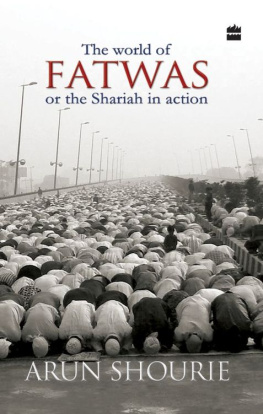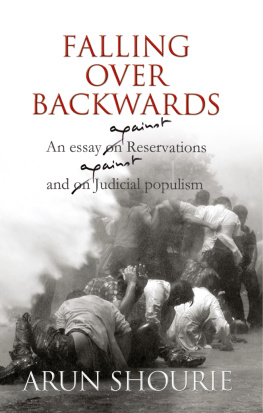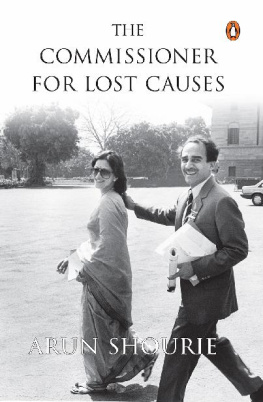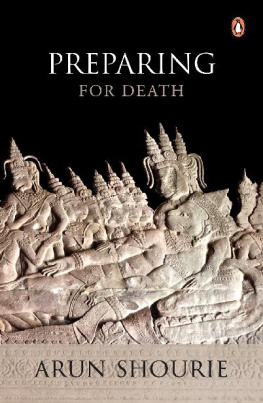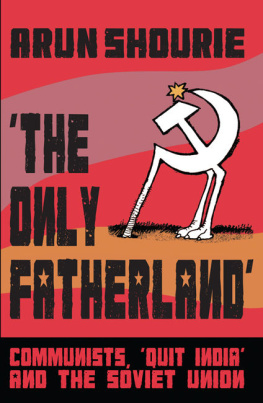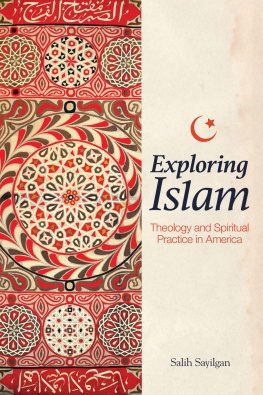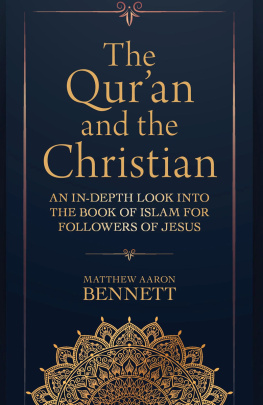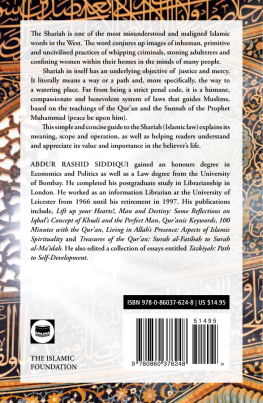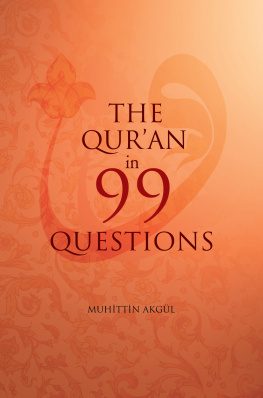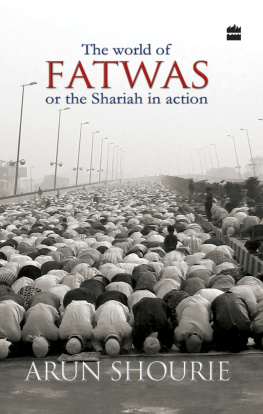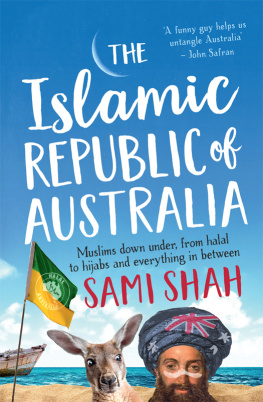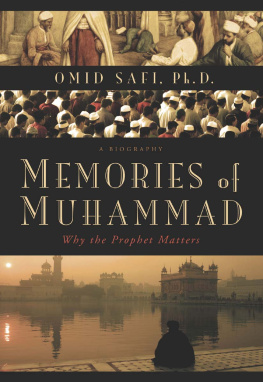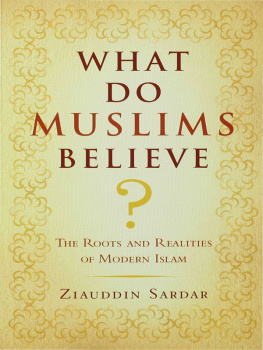The World of Fatwas
or the Shariah in Action
ARUN SHOURIE

For
reformers
of all traditions
Contents
A fatwa is a decree, a ruling. The usual sequence is that a Muslim puts an issue before an authority, and the latter rules on the matter. The authorities that can issue a fatwa are well recognized. They can be individuals, they can be institutions an institution like the Dar al-Ulum at Deoband has a special department for just this purpose. Of course the authority may take up a matter suo motu also.
The fatwas accumulate. From time to time they are compiled. These compilations become both the high literature of the community as well as the Islamic version of Supreme Court Reports. They are read by, and read out to the faithful. The conduct, and even more so the mind of the community is set by themdirectly in some matters, indirectly in even more. In particular, the local maulvi, to whom the average Muslim is liable to turn when he is in doubt about some point of conduct or when he is entangled in a dispute with another person, will turn to what some authority has decreed in its fatwa on the matter. Problems of life, belief and law which confront the believer are thus answered by the fatwas, explains the twelve-volume collection of fatwas issued by the Dar al-Ulum, Deoband, as there is no question about human life, it explains, for which the Mufti cannot obtain the answer by looking up the Book of Allah, the Sunna of the Prophet and the law books. Moreover, it explains, the fatwas have saved the ordinary Muslim the travails of inquiry in regard to the Book, the Sunna and the rulings of the jurists of the schools of Islamic law. Issuing fatwas is an art, it explains, by which answers to day-to-day problems are obtained. One cannot obtain these answers from any other source, it declares. And, as will become apparent when we consider the content and range of the subjects which the fatwas tackle, there can be no doubt that the mufti issuing fatwas has to have encyclopaedic knowledgefor he will be required to pronounce on matters that range from personal hygiene, to marital relations, to the fine points of the law on inheritance, to whether the earth moves around the sun or the sun moves around the earth, to the way a Muslim should live in and the extent of allegiance he should owe to a country like India.
In the bookshops in the Muslim areas of our citiesfor instance in the bookshops around the Jama Masjid in Delhi the collections of fatwas fill shelves after shelves. They are put together with great care, the sort of care one associates with sacred literature. The pages are well laid out. The calligraphy is often a work of art. The volumes are beautifully bound ever so often with gilded embossing on the covers.
In a word, fatwas are the shariah in action. Now, we are being continually told that the shariah is sacred, that it cannot be touched, that it is of the essence of Islam, that touching it would be nothing short of an assault on Islam. One would therefore expect that there would be studies upon studies of these volumes of fatwas. At the least one would expect that those who regard continuing separate personal laws for the Muslims to be an eternal commitment, one would expect at least them to have devoted some time to studying these volumesafter all, they are asking that something be continued; surely there would be some curiosity to find out what it is that they are urging be continued.
The other point relates to the ulema. While there is no clergy or Church in Islam, the ulema exercise decisive influence over the community. The fatwas are their most accessible output. They reveal the mindset of the ulema. They reveal the mindset which the ulema seek to instil and perpetuate in the community. In fact, because of the way most fatwas come to be giventhat is, by a layperson asking the authority for a ruling on a matterand because of the way the volumes are organizedthey first set out the question which the querist has sent, and then give the rulingthe volumes are an excellent prism through which one can glean the mind of the community as well, a prism through which one can glimpse the concerns of the community as well as the presuppositions which the community has internalized.
For all these reasons one would expect a host of studies on fatwas. But then one would reckon without our intellectuals. It is yet more proof of the fact that our intellectuals have seceded from our country; that there is hardly a study in either English or Urdu on the fatwas. During the months that I worked on the subject I came across just two solitary essays on it. The poor things could hardly be called studies: they were inadequate, in fact they were timorous.
The reason for this inattention is not that some inquiry has led our intellectuals to conclude that the fatwas are unimportant. The reasons are less estimable.
First, our scholars have not spared time for this vital material for the same reason on account of which they have not spared time for other things vital to our existence as a country. Most of the intellectual work in India consists in writing footnotes to work being done in the Westthis has been so in the case of Marxist intellectuals even more than it is in the case of the others. And when our intellectuals are not engaged in writing these footnotes, they are busy following the fashion of the day in Western circles, busy applying, as the phrase goes, to Indian material the notion or thesis which has become fashionable in the West. In a word, our scholarly work is derivative. So the first reason there has been no substantial study of the fatwas in India is that they have not yet caught the eye of the West.
The second reason is that analysing the fatwas would expose that which neither the secularist nor the liberal Muslim wants exposed. The liberal Muslim has internalized the notion that to bring the truth about the shariah to light, to put in the open facts about those who are the public face of the community, is to help the enemies of Islam. The secularist is even more reluctant to have these facts put to public view. He has established his credentials of secularism by espousing the very positions which the ulema and fundamentalist Muslim politicians have advocated. Once the facts about the ulema, about the law they lay down, about the norms they prescribe become common knowledge the secularist would be out of the very thing he has made the proof of his secularism.
The third reason is just plain funk. Bringing the truth about the ulema and their fatwas out into the open is certain to call upon one the wrath of the ulema. The secularist naturally does not want that to happen: quite the contrary, he is ever anxious to be in the good books of the ulematheir certificates are invaluable in establishing his credentials; being invited to their gatherings is what gives him an edge over other secularists. And the liberal Muslim doesnt want to tangle with the ulema for the very reason that they have the power to issue fatwas.
Yet the subject is of manifest importance: the shariah is a vital public issue in India today, and the fatwas are the shariah in action; no group exercises greater influence over the average Muslim than the ulema; and nothing reveals the mindset of the ulema as do the collections of their fatwas.
Hence this study.
I have taken up five collections of fatwas for analysis. These are:
- Fatawa-i-Rizvia, Volumes I to XII;
- Kifayat-ul Mufti, Mufti Kifayatullah ke Fatawi, Volumes I to IX;
- Fatawa-i-Ulema Dar al-Ulum, Deoband, Volumes I to XII;
- Fatawa-i-Ahl-i-Hadis, Volumes I to IV;
- Fatawa-i-Rahimiyyah, Volumes I to III.
Next page
